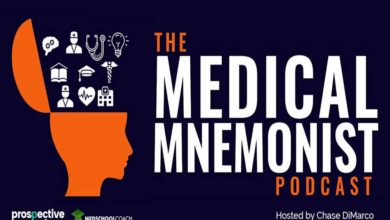Chase DiMarco talks about one of the most ignored yet crucial topics in medicine: mental health. He explains why physicians and medical students struggle with mental health, the rise in suicide rates in medicine, and the benefits of having a social network.
- [00:50] Mental Health in the Medical World
- [02:50] The Neuroscience Aspect of Mental Health
- [04:24] Chronic Stress and the Recency Bias
- [07:17] The Importance of Having Social Networks
- [10:40] Positive Effects of Mindful Self-Compassion
Mental Health in the Medical World
If you’ve been listening to this podcast for a while now, you’ll have noticed that we sometimes cover topics that are not necessarily related to medicine. Today, we’ll cover mental health, a topic that most of us can relate to and some grapple with. The medical profession is one of the most mentally demanding professions in the world right now. The pressure to be the best and compete against the best can sometimes be overwhelming. Unfortunately, the pressure typically starts to manifest on the first day of medical school and lasts several years after graduating. If you’re struggling with mental health issues, you’re not alone. Experienced physicians and med students, Chase included, struggled/struggle with it too. The good news is that there are groups in Clubhouse where experts share insights into dealing with mental health and chronic stress.
Chronic Stress and Recency Bias
Sadly, suicide rates among physicians and medical students are significantly higher than in the general population. Experts explain that this is partly due to recency bias. Recency bias is a cognitive bias that favors recent events over historical events. Med school and residency are times when students are under a lot of stress to study more, do more, and achieve more. Consequently, many physicians believe that the stressors affecting them today will last long into their careers. It’s like there is no light at the end of the tunnel. Although you might experience a few hiccups once you become a doctor, it gets easier with more experience. You just need a little confirmation that whatever you’re working for, no matter how long it takes, will be worth it.
Importance of Having a Social Network
In general, and this is not only from a medical perspective, if you listen to success stories from accomplished entrepreneurs, you’ll notice that they all have one thing in common– they overcame life’s hurdles. Additionally, they had social networks that they could tap into whenever problems came knocking. Unfortunately, as medical students, we tend to value independence more than anything else. Independence might work from an education point of view, but it often leads to burnout. No matter how busy you are, you can’t kill social contact. Dismissing social connections with friends and family is not sustainable from a mental health perspective.
It would be best if you had a few friends and family to talk to whenever the need arises. And if you’re not comfortable sharing your pain points with close friends, you can always consult a psychiatrist or a therapist. You are not alone in this; help is right around the corner; you just have to make the first move.
Positive Effects of Mindful Self-Compassion
When we hear about self-compassion, the first thing that comes to mind is that there is no science behind it. However, there are conclusive studies that reveal how different self-care techniques can positively impact your daily life. Things like meditation, exercising, yoga, and other physical and mental activities can significantly improve the way we approach life. Regretfully, mental health topics are not part of today’s medical curriculum. Thus, it’s up to you to learn how to handle these issues as much as possible. We understand that time is not always on your side, but a few minutes spent listening to insightful information on platforms like Clubhouse is all you need to get started.
Listen to our past episode on Anxiety and Depression.
Share your experiences, tips, and suggestions to [email protected]. Or you can directly reach out to Chase on LinkedIn, Twitter, or Instagram. Join the Medical Mnemonist Master Mind Facebook group and find our Blog posts, Podcasts, and other Resources at FreeMedEd.org!
